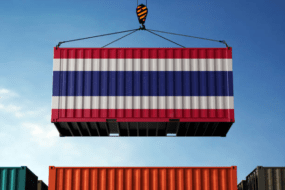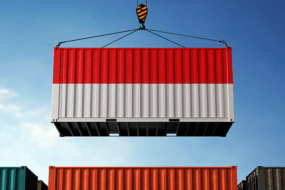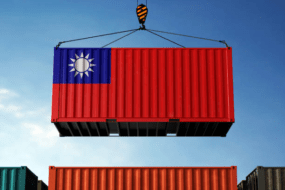- Home
- Trade News
- Petroleum Istanbul: The Gatewa ...

Turkey is a country that is rapidly industrialising and has a rising economy; the oil and petroleum industry is an important aspect of that progress and is playing an increasingly important role. Turkey is considered to be a “net oil importer,” which indicates that the country brings in a greater quantity of crude oil than it ships out. Despite this, the oil and petroleum sector of Turkey’s economy provides a substantial contribution to the nation’s overall economy and is absolutely necessary for meeting the country’s demands for energy.
Turkey’s manufacturing industry has also been growing. The country has invested considerably in manufacturing, focusing on efficiency and modernisation. Hence, the sector has grown, drawing local and global investments and boosting Turkey’s economy. Turkey’s manufacturing industry has also been gaining traction The Petroleum Istanbul trade expo, which takes place once a year in Istanbul, is widely regarded as one of the most important events in the oil and petroleum industry in Turkey.
The development of the Turkish oil and petroleum industry
When Turkey’s oil and petroleum industries initially began to develop in the early 1900s, the Ottoman Empire was still in existence and still in control. In 1914, a search conducted in the southeast of Turkey led to the discovery of the country’s first oil field. The company grew at a rapid rate as a result of the discovery of new oil resources during the course of history.
The 1960s and 1970s saw a surge in oil and gas exploration in Turkey, which resulted in the discovery of a large number of substantial oil reserves. These discoveries helped Turkey become less dependent on oil imported from other countries and more self-sufficient in terms of its energy needs.
Production of oil and other petroleum in Turkey
The majority of Turkey’s crude oil and petroleum are produced in the southeast of the nation, which is also its most industrialised area. The provinces of Batman, Diyarbakir, and Siirt are home to the majority of Turkey’s oil resources, while the region surrounding the Black Sea is home to the majority of the country’s gas fields.
The Turkish Petroleum Corporation is the most important player in Turkey’s oil and petroleum industry (TPAO). It is a company that is controlled by the state and is in charge of the exploration, production, and distribution of oil and gas throughout the country. In addition to TPAO, there are a number of other private companies that are working in the industry. Some of these companies are Royal Dutch Shell, BP, and ENI.

Oil and petroleum refineries in Turkey
Turkey is home to a number of oil refineries, each of which plays a critical role in meeting the country’s need for electricity. Izmir is the location of Turkey’s largest refinery, which has the ability to process 11 million tons of crude oil per year. The cities of Batman, Kocaeli, and Istanbul each have a greater number of refineries.
The vast bulk of Turkey’s crude oil is brought in from other countries in order to be refined in the country’s oil refineries. When the crude oil has been refined, a range of products, including as gasoline, diesel fuel, and jet fuel, may be manufactured from it. These products are then sent to various parts of the country.

Challenges facing the Turkish oil and gas sector
The oil and petroleum industry in Turkey is facing a variety of challenges, despite the fact that it plays an essential part in the country’s overall economy. One of the primary concerns is the dependency of the country on foreign sources of energy. Since more than 90 percent of Turkey’s oil comes from outside sources, the country is vulnerable to shifts in the global oil market.
Another challenge that the business must confront is the need to invest money in innovative technologies in order to raise productivity and reduce the company’s impact on the environment. As usage of fossil fuels is a big contributor to climate change, the industry must make investments in cutting-edge technology in order to mitigate the negative impact that it has on the environment.
The political upheaval in the region is ultimately to blame for the challenges faced by the business. The ongoing conflict in Syria and the threat of terrorist activity in the region have combined to create an unstable environment, which puts Turkey’s oil and petroleum industry in a precarious position.
In conclusion, the oil and petroleum industry is an extremely important contributor to Turkey’s economy. Notwithstanding the challenges it faces, the industry continues to play an essential role in assisting the country in meeting its energy requirements and fostering economic growth. As the oil and petroleum industry continues to grow, it will play an increasingly significant role in meeting the nation’s need for energy and contributing to the nation’s overall economic growth.
The Petroleum Istanbul Expo
Petroleum Istanbul is the most important business event in the Eurasian region for the upstream and downstream technology, equipment, and services related to the petroleum industry. The expo receives attendees and participants from all corners of the world at each and every one of its annual events. This post on the blog will give readers with a summary of the fair, its relevance, and what participants may see while they are there.
Since Petroleum Istanbul was established in 1997, the company has a significant amount of history. During the course of its existence, the fair has evolved into one of the largest and most important gatherings that is held in the petroleum industry. Messe Frankfurt Istanbul Ltd., Hannover-Messe International Istanbul, and Enerji Fuarcilik partnered to arrange the expo.

Photo credits: Petroleum Istanbul website
Significance of Petroleum Istanbul
The petroleum industry places a significant amount of reliance on Petroleum Istanbul. It provides professionals in the sector with the opportunity to demonstrate their products, services, and technologies to a large audience. During the expo, participants will have the opportunity to network with their peers and get information about the most current developments and trends in the industry.
Visitors to Petroleum Istanbul will have the opportunity to get knowledge about the latest instruments and methods that are used in both the upstream and downstream sectors of the petroleum industry. The expo provides guests with a location in which they may network with prominent businesspeople, learn about the most current trends, and contemplate beginning new company endeavours.
What you might anticipate at Petroleum Istanbul
The expansive trade event that is known as Petroleum Istanbul covers the whole of the petroleum industry. During the expo, there are booths for upstream as well as downstream providers of equipment and technology, as well as service providers and suppliers. Visitors get the opportunity to interact with exhibitors to acquire further information on the most recent products, technologies, and services that the exhibitors are displaying.
During the expo, specialists from the industry are given the opportunity to present the most current research and developments in the petroleum industry. Throughout the course of the event, there will be technical discussions and seminars presented so that guests can get an inside look at the most recent developments and trends.
One of the highlights of the event is the business-to-business (B2B) matching service, which gives attendees the opportunity to schedule meetings with other attendees. Participants in this program are given the opportunity to expand their professional networks and forge new alliances.

Photo credits: Petroleum Istanbul website
Exhibition sectors
During the Petroleum Istanbul trade show, each of the different exhibition areas focuses on a different aspect of the petroleum industry. These are the types of sectors:
- Upstream: There are companies that specialise in providing tools and services for oil and gas exploration and production in this sector. Guests may look forward to viewing the most up-to-date seismic testing, geological mapping, and drilling equipment during their visit.
- Midstream: The primary focuses of this sector of the energy business are the provision of services and commodities for the purposes of storage and transportation. These exhibitions include displays of pipelines, tankers, and storage facilities among other things.
- Downstream: Exhibitors in the downstream sector encompass activities such as refining and petrochemical manufacturing in addition to other downstream operations. The most recent developments in refining technology, petrochemical manufacture gear, and downstream equipment are likely to be on display for attendees.
- Environment and Safety: The environmental and safety issues that are relevant to the petroleum industry are the primary emphasis of this sector. Exhibitors in this area provide the most cutting-edge products and technologies, with the goals of reducing the industry’s impact on the environment and boosting workers’ levels of protection.
- Technology and Services: Exhibitors in this area provide the petroleum industry with a wide range of services, including IT services, consulting services, and legal services, among other types of services.
Conclusion
The Petroleum Istanbul conference is an important event for the petroleum industry in the Eurasian area. During the expo, professionals from many industries have the opportunity to showcase their products, services, and technological advancements to a sizable audience. Visitors to Petroleum Istanbul will have the opportunity to find new business opportunities while also gaining insight into the industry’s most current fashions and technological developments.
Since it features such a wide variety of exhibiting industries, as well as technical presentations and a B2B matching program, the fair is an absolute must-attend event for anybody interested in the petroleum industry. Since the petroleum industry in the Eurasian region continues to expand and develop, Petroleum Istanbul is likely to remain an essential component of this growth and development process.
Did Petroleum Istanbul get you all excited? Read our 10-step guide for a successful trade show to prepare for your future exhibition! For more tips and tricks on boosting your business, you can also refer to our blog about leads generation for oil and gas businesses!
TradeData.Pro is your best tool if you can’t participate at Petroleum Istanbul at this time.
TradeData.Pro provides businesses with valuable insights into trade data, helping them identify potential opportunities to explore. The platform offers a range of features and tools that make it easy for users to search and access the information they need. You can search for trade data by product, company, country, or HS code, and get access to detailed information about importers, exporters, suppliers, and customers, as well as shipping data such as the quantity, value, and port of origin/destination.
Sign up now on our website! Give our Instagram, TikTok, and Facebook channels a follow for the latest trade news and updates!
Want to learn more? Contact one of our sales representatives on WhatsApp to set up a demo!
The most trustable and reliable source for Trade Data.
TradeData.Pro is a reliable and trustworthy source of trade data proudly made in Singapore, a country known for its stable political climate and trade-driven economy. Presented by Commodities Intelligence Centre, a government-linked company and a joint venture of Zall Smartcom, SGX, and GeTS, TradeData.Pro has received positive feedback from the market since its launch in 2018 for its extensive coverage, affordability, and fast response. The platform has been awarded the Singapore Quality Class in 2020 and the Stevie Award Gold in 2021.
Traditionally, obtaining critical data to reveal trends, identify market opportunities, track competitors, buyers, and suppliers, and better understand the potential of the supply chain has been a challenge. However, the detailed shipment information that is part of government import and export filing requirements does exist and forms the core of global trade. TradeData.Pro has gathered and packaged this information as business intelligence, which helps companies understand the flow of goods across borders and features the world’s largest searchable trade database. TradeData.Pro reviews, standardizes, and cleans data and delivers it in an intuitive format, making it easier for businesses to access.
Businesses interested in staying updated on Vietnam, the hottest industry lately, can access all relevant information on the TradeData.Pro platform. They can find the exact product they’re interested in by checking out the trade database demo at https://tradedata.pro/asia-trade-data/vietnam-import-export-data/. To learn more about accessing new markets, visit https://tradedata.pro/trade-database-demo/.
Additionally, businesses can check out this article to learn how to use TradeData.Pro to access Global Trade Markets: https://blog.tradedata.pro/say-hello-to-our-new-release-of-tradedata-pro/. To understand how TradeData.Pro works, watch the video below or visit https://www.youtube.com/watch?v=tITfUvjs6Gc.
Business Economy Export Global Import International Trade istanbul Markets Opportunities Supplier Trade Data Pro Worldwide








